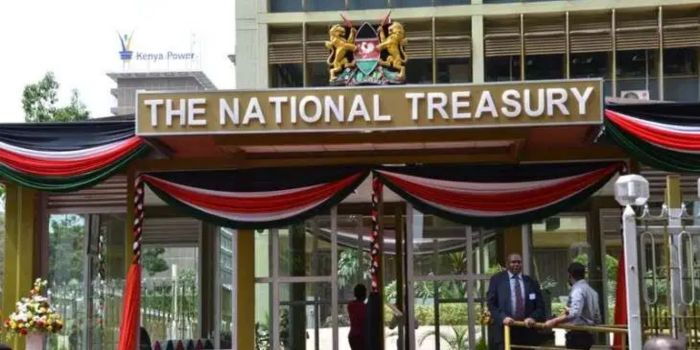The National Treasury cannot account for Ksh160 billion spent in external debt repayment for the past three financial years, according to a new audit report. This comes as the government plans to borrow Ksh413 billion in the current financial year, according to Treasury CS John Mbadi.
A Special Audit Report on the Servicing of External Loans has raised concerns about budgeted corruption, possible plunder, and wastage of public resources.
In the report, Auditor General Nancy Gathungu expressed concerns regarding Ksh161 billion in unclear debt repayment over the past three financial years.
Gathungu reported to the National Assembly’s Public Debt and Privatisation Claims Committee that there were discrepancies between the budgeted and actual debt servicing amounts for the financial years 2020–2021, 2021–2022, and 2022–2023.
Former Treasury Cabinet Secretary Njuguna Ndung’u (left) and Treasury Principal Secretary Chris Kiptoo (centre) preparing to submit the proposed budget to the National Assembly
Photo
National Treasury and Economic Planning
These variances exceeded the 5 per cent limit allowed by law, reaching as high as 10 per cent of the approved amounts for the fiscal year.
According to the report, the Treasury underpaid by Ksh1. 4 billion in 2021 and a staggering Ksh83.3 billion in 2022. The Controller of Budget had budgeted Ksh235.3 billion in 2021 and Ksh339 billion in 2022.
In the next financial year, the Treasury went over and beyond the approved amount by Ksh77 billion. The Controller of Budget had set aside Ksh311 billion for the debt reservicing.
On Wednesday, November 27, MPs put Treasury to task to explain the anomaly raised by the auditor general.
“This could be an issue of corruption…the procurement laws are very clear. You don’t procure services and goods beyond your budget,” stated Joseph Makilap, Baringo North MP.
In its response to the Auditor General, Treasury defended the variances, stating that the fluctuations were caused by the exchange rates of the Kenyan shilling against other currencies.
In her report, Auditor General Nancy Gathungu noted gaps in documentation, making it impossible to trace the borrowed funds to specific projects.
The audit examined 32 sampled project loans and found that only 18 had undergone feasibility studies to justify their necessity.
Additionally, 22 of these loans lacked documentation or evidence of public participation, resulting in projects implemented without meaningful input from citizens.
The report further revealed that many of the loans did not receive the required approvals, exposing the projects to risks of double financing and unbudgeted costs.
Alarmingly, only 5 of the 32 loans had obtained legal opinions from the Attorney General, raising serious concerns about the legal and procedural compliance of the borrowed funds.
President William Ruto, accompanied by Treasury CS John Mbadi at the Inua Biashara MSME Exhibition at the KICC in Nairobi on October 17, 2024. PHOTO/ William Ruto


